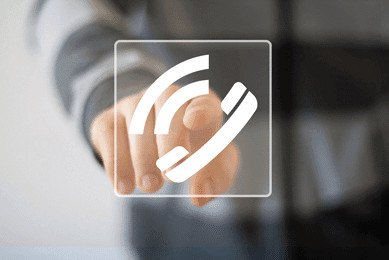 The availability of fiber is incredibly important for an SMB to be aware of. Because: Copper can become the bottleneck in your communications platform, and limit your communications bandwidth.
The availability of fiber is incredibly important for an SMB to be aware of. Because: Copper can become the bottleneck in your communications platform, and limit your communications bandwidth.
Digital communications (Ie. VoIP) are subject to degradation at any point in the channel from office to the final recipient. When the “Last Mile” of copper does not have the bandwidth to properly support the business’ requirements, call quality can degrade. That’s the high level. Let us explain.
First off, we are aware this might be a downer. Many people assume we have fiber everywhere now, but the truth is, the United States still uses copper for some of its broadcasting, even though optical fiber is so much faster. This article will talk about Atlanta specifically, which part of our broadcasting is typically transmitted through copper, and what to do if you need fiber, but have copper.
What telecoms refer to as “the last mile” is still mostly made of copper. This is the final stretch connecting individual residences and office buildings to the nearest fiber channel. So even though the Internet is largely connected by fiber now in terms of distance, that last little burst to your business’ doorstep is most likely copper. The material that conducts your voice to the customer on a cell phone is partially the same as it always was.
Upgrading the last mile in the network is much harder because it takes up the most time, by far. Draw a straight line across the United States, and measure it; you’ll read about 2,680 miles. But the “last mile” is applied to every single household in the United States. We are talking millions – not thousands – of miles of fiber.
Telecom providers have laid the basic infrastructure to connect cities with fiber, but they cannot foot the bill to upgrade everyone’s last mile, all at once. Which is unfortunate because with bandwidth, the lowest common denominator is the bottleneck; it limits the maximum speed of the connection. The last mile of copper means your upload and download speeds will be at the rate of copper – no matter how sophisticated your office IT becomes.
Although copper can achieve speeds of up to 150 megs download and 20 megs upload, fiber provides literally gigabytes of bandwidth. And the connection speeds will only increase with time.
If your office is in or near downtown Atlanta, then odds are you are close to fiber. About half the office buildings are “lit” now. A building is “lit” when it have a fiber connection in the bottom of the building, and they can easily extend that fiber connection to your office.
Just to clarify, some SMBs only need copper. But when businesses start using VoIP, that copper can become the bottleneck in your communications platform. It’s definitely something an SMB should know and take into consideration. If you are switching to digital business communications, then ask a trusted IT person about bandwidth requirements.
Call our business managed IT services department directly at (404) 777-0147 or simply fill out this form and we will get in touch with you to set up a getting-to-know-you introductory phone call.
Fill in our quick form
We'll schedule an introductory phone call
We'll take the time to listen and plan the next steps
11285 Elkins Rd Suite E1, Roswell, GA 30076
© Copyright 2024 Centerpoint IT. All Rights Reserved. Website in partnership with Tech Pro Marketing. | Privacy Policy
Get Immediate Help For All Your Technology Issues (404) 777-0147

If you want our team at Centerpoint IT to help you with all or any part of your business IT, cybersecurity, or telephone services, just book a call.
Fill in your information below to get started today.
"*" indicates required fields
Fill in your information below to schedule now.
"*" indicates required fields
Before your organization commits to 1, 2, 3 or even longer managed IT services contract, understand what you’re getting. Centerpoint IT gives you the facts in our Managed IT Services Buyer’s Guide.
Enter your information below and we’ll send it over.
"*" indicates required fields

We are turning 15 and want to celebrate this milestone with you because without you this would not have been possible. Throughout this year look for special promotions on services and tools aimed at Making IT Simple for You so you can focus on your business.

We are turning 15 and want to celebrate this milestone with you because without you this would not have been possible. Throughout this year look for special promotions on services and tools aimed at Making IT Simple for You so you can focus on your business.
https://calendly.com/centerpoint-it/discovery-call